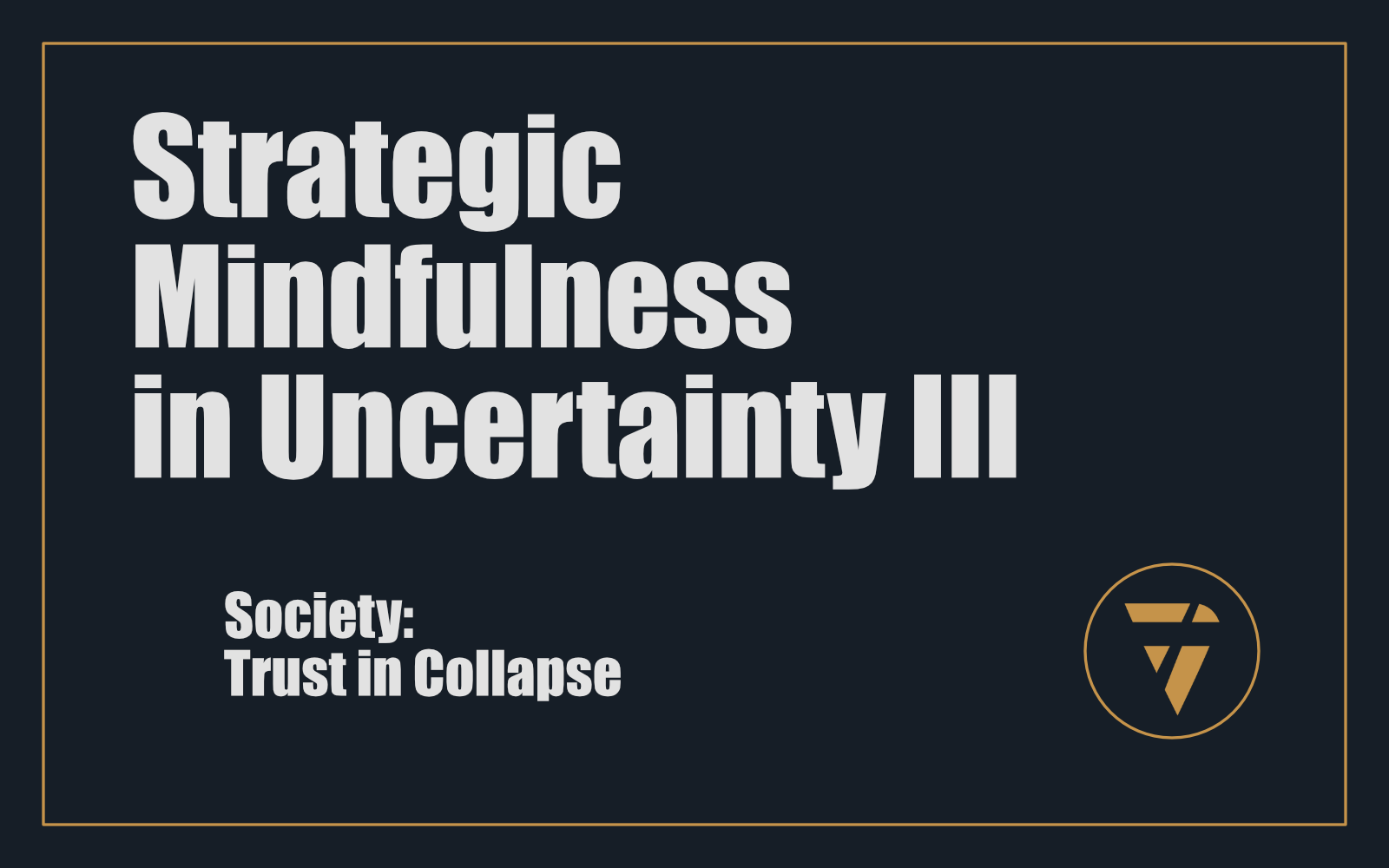Strategic Mindfulness in Uncertainty III

Society: Trust in Collapse
Institutions are burning trust faster than they build markets.
It’s the slow bleed nobody wants to measure. Governments collapse in failure. Media trades authority for clicks. Corporations gut their own credibility chasing quarterly optics. Universities, banks, and once-stable systems lose their footing one breach, one lie, one broken promise at a time.
This is not a temporary crisis. It's the new condition of society: credibility consumed faster than it can be replenished.
And here's the law: in a world of distrust, capital doesn’t lead. Social capital does.
The Hidden Balance Sheet
Every business keeps financial statements. Few keep trust statements. And yet trust is the real ledger beneath commerce.
- Consumers buy from those they trust, not those who scream the loudest.
- Investors back leaders whose word holds weight, not just those with sharp decks.
- Communities rally around institutions that prove presence, not just posture.
This is why social capital is the currency beneath every transaction. It moves slower than money but compounds deeper. And when it collapses, no capital injection can save you.
Trust is the hidden balance sheet that determines whether financial growth survives volatility. Ignore it, and your business is already burning from within.
How Institutions Burn Trust
Trust doesn’t collapse overnight. It erodes drip by drip.
- Governments erode trust when policy becomes performance theatre. Promises without delivery, rhetoric without architecture. Citizens stop listening.
- Media erodes trust by choosing speed over accuracy, outrage over depth. Once the gatekeeper of truth, it now competes in noise.
- Corporations erode trust when optics outpace integrity — ESG campaigns masking exploitation, “customer obsession” masking exploitation, growth masking drift.
- Education and finance erode trust by monetising students and clients instead of serving them. Degrees lose value, financial products turn predatory.
Each erosion is a withdrawal from the trust balance sheet. Institutions spend trust like it's infinite. It's not.
And when volatility strikes, those with no reserves collapse.
Why Leaders Miss the Collapse
Most leaders can’t see trust until it is already gone. They measure it in lagging indicators — surveys, polls, scores. By the time those numbers show decay, collapse is already underway.
This blindness comes from one root: distraction. Leaders are too busy chasing growth metrics, investor demands, or political cycles to notice the silent fracture of trust.
Strategic mindfulness deletes that distraction. It trains leaders to see beneath the noise. To read the mood before it crystallises. To catch erosion before collapse.
This is not instinct. It's discipline.
Strategic Mindfulness as a Social Tactic
Mindfulness in society is not peace. It's surveillance. Not of markets, but of moods. Not of numbers, but of narrative.
The mindful operator watches silence, not just speech. They notice when the audience no longer responds. When followers stop engaging. When employees stop believing. When customers stop forgiving.
Strategic mindfulness is the discipline of reading currents invisible to those blinded by their own noise.
This is why it has power. Because in a world of collapsing trust, the one who can see beneath the noise owns the narrative.
The Operator’s Edge
Narrative is not story. Narrative is alignment. It's the shared belief that what you say and what you do are one.
When institutions burn trust, they burn narrative. When they collapse, it's because their stories and their actions fractured beyond repair.
The mindful operator doesn’t wait for collapse. They track alignment every day:
- Do my customers believe my promise?
- Do my employees believe my leadership?
- Do my investors believe my numbers?
When belief erodes, collapse begins. The mindful operator doesn’t react after the fact. They compress presence into prevention. They restore alignment before fracture.
This is the edge.
Case Study: Collapse of Trust
Look at Facebook. Once the social glue of the internet. Now a case study in distrust. Privacy breaches, manipulative algorithms, political interference.
Revenue remains strong by control. But trust evaporated. And once gone, no rebrand, no acquisition, no capital can restore it.
The decay was visible years before collapse. The silence in user sentiment. The outrage buried under dependence. But leadership didn’t read it. They were blind to the erosion of social capital.
Now, even with billions in revenue, the brand carries distrust as its shadow. That shadow is permanent.
Case Study: Preservation of Trust
Contrast this with Patagonia. Not perfect. Not immune. But disciplined in alignment. Every claim — sustainability, environmental commitment, ethical sourcing — is audited against presence.
When they make mistakes, they acknowledge them quickly. When they grow, they compress decisions against their core values. They protect trust equity because they know it is their hidden balance sheet.
This is not branding. It's architecture. And it pays.
The Three Drills of Social Mindfulness
To install Strategic Mindfulness in the social arena, leaders must practise three drills:
- The Trust Ledger
Each quarter, audit your trust equity like you audit your finances.- Where have you overpromised?
- Where have you underdelivered?
- Where is alignment breaking?
- The Silence Scan
Weekly, track where engagement drops. Not in numbers, but in tone. Where is the market quiet where it once responded? Silence is the earliest indicator of distrust. - The Mood Read
Train presence in conversations. With employees. With customers. With investors. Listen not for what they say, but for what they withhold. That gap is the fracture line of trust.
Run these consistently, and you will see trust fractures before they collapse.
Consequence
Institutions are burning trust faster than they build markets. Most leaders won’t survive this. They are blind, busy scaling noise while credibility dissolves.
The mindful operator is different. They see beneath the surface. They read moods before markets. They detect fractures before collapse.
Social capital is the hidden balance sheet. It compounds deeper than money. And in uncertainty, it's the only currency that matters.
Strategic mindfulness is not calm. It's compression. It's presence sharpened into surveillance. It's the ability to see what others miss, and to own the narrative because of it.
The operator who installs it will not just survive the collapse of trust. They will control the systems that emerge after it.
This is what I’m working on. Tell me what you think, I enjoy the conversation! Subscribe and follow the work in real time.
Thanks!
B

Institutions are burning trust faster than they build markets. Money doesn’t move society anymore, belief does. Strategic mindfulness isn’t calm. It’s surveillance. Read moods before markets and you own the narrative.
PS -






